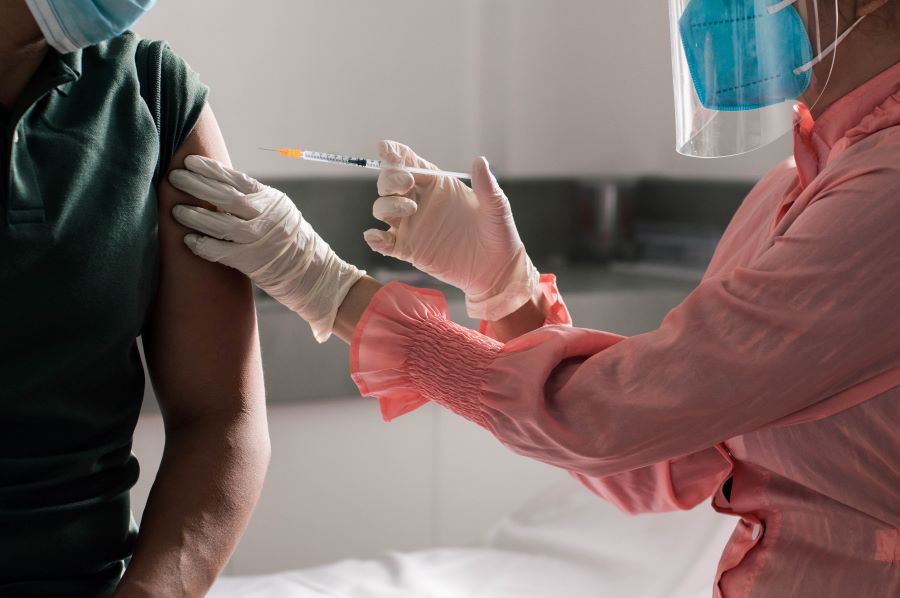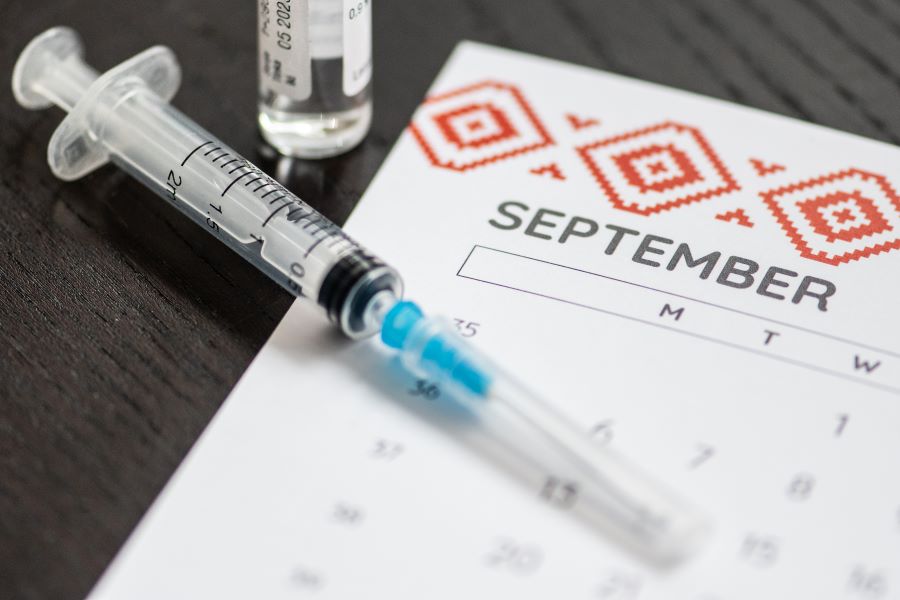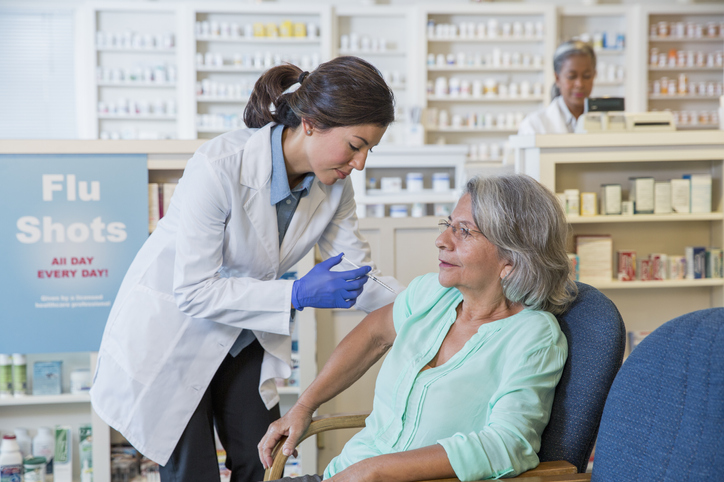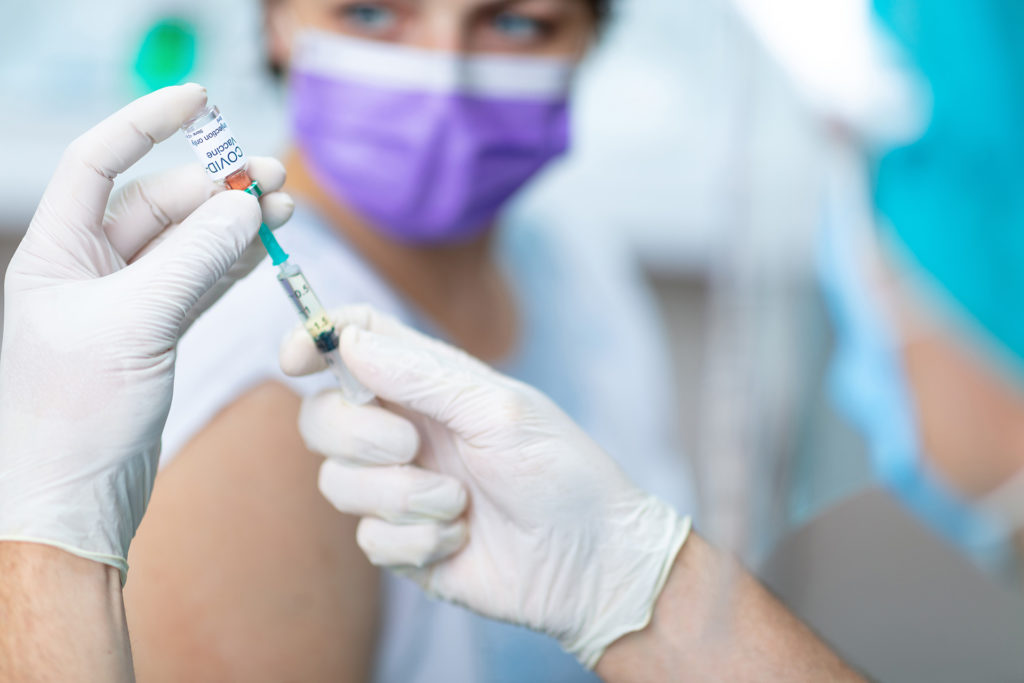- CDC: Vaccine Information for Healthcare Providers/Professionals
- CDC: Healthcare Providers/Professionals Patient Education
- CDC: Talking to Patients About Vaccine Safety
- CDC: Talking with Parents About Vaccines
- DHSS: Health Care Professionals’ Vaccine Resource Hub (includes study referenced above)
- AAP and FrameWorks: Communicating About Vaccination in the United States
- FrameWorks: Reframing the Conversation About Child and Adolescent Vaccinations
- BJM Article: Behavioural Interventions to Reduce Vaccine Hesitancy Driven by Misinformation on Social Media
- Information and technical direction from the CDC can be found here: Vaccine Summaries for Fall and Winter Virus Season
Expert

Kara Amann
Actions
Type
Topic
- Disease Management
Tags
Hospitals and Health Care Providers
Fall and winter mark the respiratory virus season — a time in which influenza, COVID-19 and RSV all typically circulate at once and have the potential to significantly impact hospital operations.
Vaccines are available for the three major respiratory viruses — influenza, COVID-19 and RSV — and are expected to be widely available. These vaccinations have the potential to significantly reduce the burden of disease on both patients and our health care systems this season. Health care providers are encouraged to talk with patients about staying up to date on the vaccinations they are eligible to receive to protect themselves and others around them, and to reduce the strain on the health care system. Additionally, providers are encouraged to discuss the testing and therapeutic options available for viral respiratory illness. To assist hospitals, community partners and providers, MHA developed this resource to provide information about these relatively new and updated vaccinations, testing and therapeutics.
Respiratory Virus Resources
for the public
for Providers
Social Toolkits
PODCAST
- PolicyHuddle – Respiratory Virus Illness Season
General Information
“As a health care professional, your strong recommendation is a critical factor in whether your patients get an influenza [or other] vaccine. Most adults believe vaccines are important, but they need a reminder from you to get vaccinated. After making your recommendation, follow up with each patient during subsequent appointments to ensure they received an influenza [or other] vaccine. If a patient still is unvaccinated, repeat the recommendation and try to identify and address any questions or concerns.” – CDC: Make A Strong Flu Vaccine Recommendation
In fact, an October 2023 DHSS study found that 8 in 10 Missourians said their health care provider is their most trusted resource for vaccines and who they turn to for questions about vaccines. In addition, 8 in 10 Missourians said they are comfortable discussing vaccines with their health care provider. However, only 1 in 5 reports talking frequently with their provider about vaccines, and 6 in 10 only discuss vaccines with their provider when they have a question or their provider brings up vaccines. Nearly two-thirds of Missourians feel vaccines are important, and 3 in 4 believe vaccines prevent disease. However, 1 in 2 still have concerns about side effects and safety of vaccines. This data indicate providers have an important role in helping patients understand vaccine safety and to increase vaccination rates in their patient population.
The way providers, public health organizations and others talk about vaccines is important, especially among those who are vaccine hesitant. Research has found that framing of messaging can make a difference in an individual’s decision to get vaccinated.
“Researchers determined that loss-based messaging is the most constructive method to communicate with vaccine-hesitant people to ensure they’re completely informed about the scope of their decision.”
The AAP commissioned a study that recommended the use of the instruction scenario — the image of vaccines as trainers (or computer updates or as a literacy metaphor) should be leveraged as much as possible by the field because it leads people to understand how vaccines work in ways that are aligned with science. This is opposed to discussing vaccines as things such as weapons or medicines.
Examples:
- “Vaccines target a specific virus, stimulate the immune system to produce specific antibodies that ‘remember’ how to fight that disease in the future, and disappear within a few days after teaching the body to respond to the virus.”
- “Getting vaccinated is like updating your computer. Vaccines are like software that contains information for our bodies to improve their performance. Just like our computers know how to detect a virus after they’ve received a software update, the body can remember how to detect and react to a virus even after the vaccine has left the body.”
- “Getting vaccinated is like learning to read and write a language. Vaccines are like a text that our body uses to practice reading and comprehending a virus. Just like we continue to read and write even after we’ve become literate, the body can remember how to detect and react to a virus even after the vaccine has left the body.”
Additionally, the CDC recommends the SHARE approach.
Share the reasons.
Highlight positive experiences.
Address patient questions.
Remind patients that vaccines help protect them and their loved ones.
Explain the potential costs of getting the disease.
Simultaneous Administration
- Providers may simultaneously administer COVID-19, flu and RSV vaccines to eligible patients. Simultaneous administration is defined as administering more than one vaccine on the same clinic day, at different anatomic sites, and not combined in the same syringe. The Health Alert Network published a Health Alert on Sept. 5, 2023, that offers additional information about the simultaneous administration of these vaccines. The CDC reinforced this in the June 27, 2024, recommendations for the 2024-2025 COVID-19 and Flu Vaccines for Fall/Winter Virus Season announcement.
- Simultaneous administration of the COVID-19 vaccine and nirsevimab, a long-acting monoclonal antibody for certain infants and young children for prevention of RSV, is recommended.
Payment
DHSS has found that many Missouri health care providers are unaware of vaccine invoicing and programs available. In fact, 1 in 4 providers were unaware they could bill for vaccine discussions.
Additionally, a little more than half of providers with patients under the age of 18 had little to no knowledge of the Vaccines for Children Program, which provides vaccines — for COVID-19, flu, RSV and more — to children who otherwise might not be vaccinated because of an inability to pay.
For information on enrolling in the VFC program, visit the DHSS website.
The federal government announced programs offering free COVID-19 tests to the public, and government-purchased Paxlovid will be available at no charge for people who are on Medicare, Medicaid or are underinsured. The CDC also will send funding to state and local health departments so they can provide free COVID-19 vaccines to uninsured and underinsured adults. See additional information in the COVID-19 section below.
The CDC offers other resources available to help providers understand how to help their patients pay for vaccines, including patients with private insurance, Medicare, Medicaid, military insurance and no insurance. Some manufacturers may have programs for low-cost or free vaccines for uninsured or underinsured individuals.
Hospitals and physician offices may receive remuneration for flu vaccines, COVID-19 vaccines and certain COVID-19 monoclonal antibodies. When services are performed in a physician office, not in a hospital outpatient department, CMS has provided information about the codes used to report the service and nongeographically adjusted payment rates. When services are provided in a hospital outpatient department, CMS uses the Medicare outpatient PPS Addendum B, which contains both the codes and nongeographically adjusted Medicare payment rates by CPT code. Certain services are paid based on cost when performed in a critical access hospital.
A best practice shared for nirsevimab related to reimbursement from payers in the hospital setting following birth, before discharge, is to ask to bill outside of the DRG to be able to bill for the administration of nirsevimab separate from a bundled payment for birth. Payers often will not increase bundled rates as this immunization is not offered year-round.
Flu
Vaccine
- The CDC recommends the annual flu vaccination for everyone ages 6 months and older, with rare exceptions. Updated 2024-2025 vaccines will all be trivalent vaccines to protect against H1N1, H3N2 and a B/Victoria lineage virus. The composition of this season’s vaccine compared to last has been updated with a new influenza A(H3N2) virus.
- Children ages 6 months to 8 years need two doses of the flu vaccine if it is their first time getting the vaccine, if they have only received one dose of the vaccine previously or if their flu vaccine history is unknown. The second dose should be given four weeks after the first.
- The CDC recommends September and October as the best time for most individuals to receive the flu vaccine. Some specific groups may be recommended to get the vaccine earlier.
-
- Pregnant people in their third trimester can get the vaccine in July or August to protect their infant after birth who is too young to get vaccinated.
- Children who need two doses of the vaccine should get their first dose as soon as the vaccine is available. Children who have health care visits during July and August can receive their vaccine if there may not be another opportunity to vaccinate them.
- Vaccination of pregnant people in their first or second trimester or adults ages 65+ should be avoided in July or August unless vaccination is not possible in September or October.
- For pregnant people, a recommendation from their health care provider is one of the strongest predictors for immunization during pregnancy for influenza (and Tdap), as odds of receiving vaccination are 10 to 12 times higher for individuals receiving a recommendation from a provider.
-
- Influenza vaccination has been shown in studies to reduce hospitalizations by an average of 40% and reduce influenza infection in infants by 34%.
- Influenza vaccination was higher for pregnant people who received an offer for vaccination during the visit or a referral to a vaccine provider (61.4%) than those who received a recommendation but no referral (22.7%). Understanding and communicating the safety and efficacy of the vaccine also is an important factor.
-
-
- Black pregnant people have a lower vaccine coverage rate and are less likely to receive a provider vaccine offer or referral. Equitable provisions of recommendations, along with culturally relevant conversations, is important to increase vaccine coverage.
-
-
- Several studies have found that focusing on the benefit and safety to the fetus was more effective than focusing on the benefit and safety to the pregnant person.
- It is important to continue to recommend vaccines to pregnant people despite previous refusal.
- The proportion of pregnant people reporting being very hesitant about receiving an influenza vaccine increased to 24.7% during the 2023-2024 season compared to 17.5% in 2019-2020.
- A barrier to vaccination of this patient group is many OB-GYN offices do not carry vaccines, so pregnant people must go elsewhere, such as a pharmacy, to get vaccinated. Studies have found that stocking vaccines in obstetric provider offices helps increase rates of vaccination.
- Common reasons for vaccine hesitancy in pregnancy include lack of knowledge, lack of access, lack of trust in health care providers and/or vaccines, lower risk perception, and racial disparities.
- Because pregnant people are more likely to be hospitalized due to influenza, severe illness can be harmful to their developing baby, and they are recommended to get the flu vaccine to protect both themselves and their babies.
- Individuals with egg allergies may receive the 2024-2025 influenza vaccine.
Treatment
- Influenza antiviral prescription drugs can be used to treat influenza, and some can be used to prevent influenza. Currently, there are six approved drugs for use in the U.S.
- Antivirals should be used as soon as possible after symptom onset for maximum benefit. They also are recommended for any patient with confirmed or suspected influenza who is hospitalized; has severe, complicated or progressive illness; or is at higher risk for influenza complications. Decisions about starting antiviral treatment for patients with suspected influenza should not wait for laboratory confirmation of influenza virus infection. Empiric antiviral treatment should be started as soon as possible in the above priority groups. Clinicians can consider early empiric antiviral treatment of non-higher-risk outpatients with suspected influenza based upon clinical judgment if treatment can be initiated within 48 hours of illness onset.
COVID-19
Vaccine
The CDC recommends everyone ages 6 months and older receive an updated 2024-2025 COVID-19 vaccine, whether or not they have previously received a COVID-19 vaccine. It is important to note that the updated COVID-19 vaccines can restore and enhance protection against the current variants responsible for most infections, decrease chances of severe disease outcomes and reduce the chance of effects from Long COVID.
The FDA approved and authorized the 2024-2025 Moderna and Pfizer COVID-19 vaccines that were updated to a monovalent vaccine based on the KP.2 variant on Aug. 22, 2024. The 2024-2025 Novavax COVID-19 Vaccine, Adjuvanted targeting the JN.1 variant has also been approved and authorized by the FDA.
The CDC recommends the following.
- Individuals ages 6 months to 4 years who have not received a previous COVID-19 vaccine should receive two doses of the 2024-2025 Moderna vaccine or three doses of the 2024-2025 Pfizer vaccine.
- Individuals ages 6 months to 4 years who have received a previous COVID-19 vaccine should receive one or two doses of the 2024-2025 mRNA vaccine from the same manufacturer as administered for initial vaccination, depending on the vaccine and the number of prior doses. The CDC has tables available that outline the number of doses for this age group based on vaccine history.
- Individuals ages 5 years and older, regardless if they have previously received a COVID-19 vaccine or not, should receive one dose of either the 2024-2025 Moderna or Pfizer vaccine.
- Individuals ages 12 years and older may receive a Novavax COVID-19 vaccine. The number of doses is based upon the individuals COVID-19 vaccine history.
- An additional dose of the 2024-2025 COVID-19 mRNA vaccines for people ages 65 and over who are not immunocompromised is not recommended at this time. The CDC ACIP will evaluate evidence and update recommendations as warranted.
- Individuals who are moderately or severely immunocompromised should follow these recommendations.
- Individuals ages 6 months and older who have not been previously vaccinated for COVID-19 should receive three doses of the 2024-2025 Moderna or Pfizer vaccine.
- Individuals who have received a previous COVID-19 vaccine should follow the recommendation for the type and number of 2024-2025 mRNA vaccines based on their age and vaccination history. The CDC has tables available that outline the number of doses for this population based on their vaccine history.
- Individuals ages 6 months and older in this group may receive one or more age-appropriate doses of a 2024-2025 COVID-19 mRNA vaccine.
- Individuals who receive pemivibart, a monoclonal antibody for COVID-19 pre-exposure prophylaxis in people who are moderately to severely immunocompromised and unlikely to mount an adequate immune response to COVID-19 vaccines, should still receive COVID-19 vaccines according to the recommended schedule. According to its EUA, administration of pemivibart should wait at least two weeks after a dose of a COVID-19 vaccine.
The CDC has tables available that outline the number of doses, dosage amount and intervals between doses for all of the above recommendations and has product summaries available for COVID-19 vaccines by manufacturer to help providers prepare for the fall and winter virus seasons. See the Resources section below.
- Several studies find that COVID-19 vaccines have a protective effect on developing Long COVID and post-COVID conditions.
- For pregnant people:
-
- COVID-19 vaccination during pregnancy is safe and reduces the risk of severe disease in pregnant people. ACOG recommends this vaccine during pregnancy and has a guide for clinicians discussing COVID-19 vaccines during pregnancy.
- A barrier to vaccination of this patient group is many OB-GYN offices do not carry vaccines, so pregnant people must go elsewhere, such as a pharmacy, to get vaccinated. Studies have found that stocking vaccines in obstetric provider offices helps increase rates of vaccination.
- Common reasons for vaccine hesitancy in pregnancy include lack of knowledge, lack of access, lack of trust in health care providers and/or vaccines, lower risk perception, and racial disparities.
Treatment
COVID-19 treatment options for both outpatients and hospitalized patients are commercially available. In most cases, treatment is most effective when started within five days of symptom onset. COVID-19 treatment guidelines are available from the CDC as well as the Infectious Disease Society of America and patient assistance programs through the HHS ASPR.
Individuals most likely to benefit from COVID-19 therapeutics are those who are more likely to get very sick, including the following.
- Older adults (especially those ages 65 years or older, with risk increasing with advancing age)
- People who are unvaccinated or are not up to date on their COVID-19 vaccinations
- People with certain medical conditions, such as chronic lung disease, heart disease or a weakened immune system
- Pregnant people
Patient assistance programs are available to help eligible individuals access COVID-19 therapeutics.
Paxlovid is a prescription antiviral drug made by Pfizer used for treatment of mild-to-moderate COVID-19 in adults who are at high risk for progression to severe COVID-19. PAXCESS is a patient support program to help patients get access to Paxlovid. Those with commercial insurance may participate in a co-pay savings program. Those with Medicare, Medicaid or no insurance may be able to access free Paxlovid through the U.S. Government Patient Access Program. Medicaid patients also can use their prescription and Medicaid card at a pharmacy to access free Paxlovid. Patients can enroll in the USG PAP by calling 1-877-219-7225 or visiting the PAXCESS Patient Portal. These resources also will help patients find pharmacies that participate in this program.
Lagevrio, made by Merck, is another COVID-19 antiviral drug. Merck has a patient assistance program that can help people receive free Lagevrio. The program is primarily for uninsured patients who could not access the drug otherwise.
Pemivibart is an EUA-approved monoclonal antibody for COVID-19 pre-exposure prophylaxis in people who are moderately or severely immunocompromised, who are unlikely to mount an adequate immune response to COVID-19 vaccination and who meet the FDA-authorized conditions for use.
RSV
Immunizations for Pregnant People and Infants
- The CDC did not update guidance for these populations for the 2024-2025 season. Recommendations from the 2023-2024 season remain.
- Pregnant people between 32 and 36 weeks’ gestation in September through January: The CDC recommends seasonal use, September through January, of one dose of bivalent Pfizer RSV vaccine, ABRYSVO, for pregnant people to protect the newborn from potentially severe RSV after birth. This is the only RSV vaccine recommended during pregnancy. This vaccination was voted to be included in the Vaccines for Children Program for pregnant people under age 19.
-
- A barrier to vaccination of this patient group is many OB-GYN offices do not carry vaccines, so pregnant people must go elsewhere, such as a pharmacy, to get vaccinated. Studies have found that stocking vaccines in obstetric provider offices helps increase rates of vaccination.
- Common reasons for vaccine hesitancy in pregnancy include lack of knowledge, lack of access, lack of trust in health care providers and/or vaccines, lower risk perception, and racial disparities.
- Providers are required to provide the vaccine information statement with the administration of this vaccine as they should with all vaccines.
- Infants: The CDC recommends use of nirsevimab, a long-acting monoclonal antibody product, in all infants under ages 8 months and younger born during or entering their first RSV season and infants and young children ages 8 months to 19 months who are at increased risk for severe RSV disease and entering their second RSV season. It can be administered with other routine childhood vaccines.
-
- The AAP, AAFP and CDC all have recommended this treatment, which has exhibited its potential to reduce the severity of RSV infections.
- Providers are required to provide the immunization information statement with the administration of nirsevimab.
- Infants can receive nirsevimab right after birth, before discharge from the hospital. A study found administration of nirsevimab for newborns born during RSV season in the hospital prior to discharge after birth ensured optimal uptake and minimized access disparities as 1 in 8 infants who are commercially insured and 1 in 4 infants on Medicaid do not have an outpatient visit within five days of discharge.
- Pharmacists can administer these immunizations but must have a prescription to do so.
- Most infants only will need the maternal RSV vaccine or infant immunization with nirsevimab. However, there are some cases in which infant immunization may be recommended after maternal immunization.
- Pregnant people should receive the vaccine during RSV season. Infants born outside of RSV season who are eligible for immunization should receive immunization as they enter their first RSV season if they are ages 8 months or younger (or second season for eligible children ages 8 months to 19 months).
Vaccine for Adults Age 60+
- The CDC updated guidance stating that adults ages 60 and older may receive a single dose of the RSV vaccine. This change was made to help simplify RSV vaccine decision making for both clinicians and the public. Additionally, the RSV disease burden among those 60 years of age and older, vaccine effectiveness using real-world data and cost-effectiveness supported these important changes. The CDC ACIP provided the following recommendations.
-
- All adults ages 75 and older are recommended to receive an RSV vaccine.
- People between the ages of 60 and 74 who are at increased risk for RSV, including individuals with cardiovascular disease, lung disease, end stage renal disease or dependance on hemodialysis or other renal replacement therapy, diabetes mellitus with end-organ damage, severe obesity, liver disorders, neurological or neuromuscular conditions, hematologic disorders, and moderate-to-severe immunocompromise. Individuals who are frail, reside in a congregate care setting such as a nursing home or other long-term care facility, and with other chronic medical conditions or risk factors that a health care provider determines may increase the risk for severe disease. This is a change from shared decision making between an individual and their health care provider that was recommended during the 2023-2024 season to help simplify the understanding of who should receive the vaccine.
- Three RSV vaccines are licensed for use in adults ages 60 and older in the U.S.: GSK’s AREXVY, Moderna’s mRESVIA and Pfizer’s ABRYSVO.
- RSV vaccines currently are not an annual vaccine, meaning older adults do not need to get a dose every RSV season. Individuals who have already received an RSV vaccine do not need an additional dose or booster at this time.
Testing Information
Diagnostic testing can help distinguish between viruses that have and do not have antiviral therapies available to reduce illness duration and severity, minimizing unintended consequences.
Diagnostic testing should be considered especially for patients with suspected RVI and those individuals with risk factors for severe outcomes and progressive illness.
COVID-19 home testing remains an option, and in many cases, retesting unless clinical presentation warrants, is not needed. In late September 2024, every U.S. household can order up to four COVID-19 tests at covidtest.gov. Additional tests will be made available at public locations such as libraries, food banks and long-term care facilities.
Find a Vaccine for Respiratory Viral Illness
Vaccines can be hard to find at times. Several vaccine locator tools are available to help you find the vaccine you need.
- Vaccines.gov – influenza, COVID-19 and RSV vaccine finder
- ABRYSVO – RSV vaccination for pregnant people and adults ages 60 and older
- AREXVY – RSV vaccination for adults ages 60 and older
- Beyfortus – monoclonal antibody RSV protection (Contact your local public health department)














